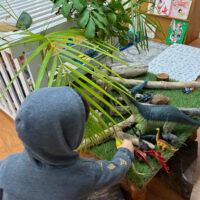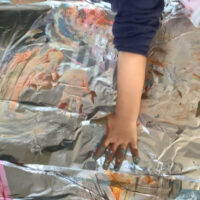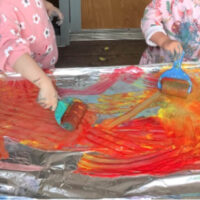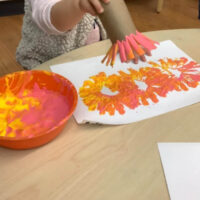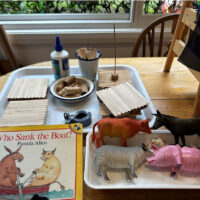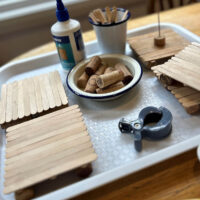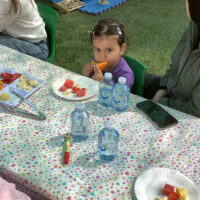Gorton House
Mulla Mulla Room
Story by Occupational Therapist Julia
Last week corporate volunteers from HSBC did a spectacular job of creating cardboard dinosaurs for the very popular dinosaur habitat in Gorton House’s Mulla Mulla room. This ties into the children’s explorations of dinosaurs, which is based on the children’s keen personal interest in dinosaurs.
Some of the children in Mulla Mulla room will also be participating in an integrated group this term focussed on ‘Dinosaur Pretend Play’, which is an extension of the regular educational program. The group will be facilitated by Occupational Therapist Julia and Educator Vasuki and will help the children explore aspects of identity and imagination through pretend play. The children will engage in and contribute to the shared play experiences used in pretend play to investigate, project and explore new ideas. Recognising and building on social connections with peers will also help the children to develop their understanding of a small group routine and build on their attention and listening skills.
Johnson House
Banksia Room
Story by Educator Cathy
To continue to offer the children in Johnson House Banksia room an opportunity to extend on developing their mathematical concept skills, last week the children had the opportunity to participate in counting and number games. This learning experience follows on from the children’s learning about shapes.
The children started the experience with clapping and counting from 1-10. As the games progressed, they demonstrated their awareness and capability in counting by doing this without prompting or guidance from Educator Cathy.
Initially the children found recognising and ordering the numbers from 1 to 10 a little challenging. However, to guide and support the children, we practiced counting out loud and matched this by counting out shapes. The children also supported each other to recognise the numbers. The children were proud of themselves as they began to recognise the numbers and to sequence them in order. To conclude the experience the children made their own number line. As the children recognised their number, they proudly shouted it out.
Through this experience the children were developing their cognitive and numeracy skills as they build on their counting skills, number recognition and sequencing/ordering numbers.
Murray House
Wattle and Jacaranda Rooms
Story by Educators Yi, Purti and Jessica
This week across Murray House the children have been very excited to create! Painting proved to be popular across both the Jacaranda and the Wattle rooms this week, with the children using paint to explore different mediums and tools.
The children in the Jacaranda room created some fantastic shiny artworks using foil and paint. They worked collaboratively to decorate the foil, using their hands and rollers to spread the paint across the table. The children in the Jacaranda room have been exploring colour, working on colour recognition skills and mixing colours, and this foil painting allowed them to have a hands-on experience with the world of colour!
Over in the Wattle room, the children used different tools to create patterns and shape prints. They used star shapes and recycled cardboard rolls to make beautiful, coloured patterns. The children are working on developing their fine motor skills and grasps, and these different tools allow them to work on their grip. They manoeuvred the shapes to collect paint, pushed the paint onto the page and then lifted the shape to reveal a wonderful print. The results were stunning, with many of the children using their developing verbal skills to describe the shapes they had created.
Painting allows children to explore so many different aspects of the world around them, including shape and colour. The children across Murray House have adored getting creative and developing their skills as they engage in these painting activities.
Family Day Care Sydney Wide
Story by Educator Support Officer Alix
This week I visited Kate’s Family Day Care in Lane Cove. Over the past few weeks, the children have been exploring their ideas around boats. Kate observed this re-occurring interest appearing in the children’s play and has been providing resources and facilitating experiences to help build upon their knowledge through learning areas such as literacy, STEM (science, technology, engineering and mathematics), process-orientated learning and imaginative play.
The popular children’s book, ‘Who Sank the Boat?’, by Pamela Allen, explores the concepts of mass, capacity and balance through an engaging and rhythmic narrative. To test these concepts (and the story’s narrative) the children made their own rafts out of paddle pop sticks and cork to see if they would sink or float and to discover if it really was the mouse who sank the boat (spoiler alert, it wasn’t!).
Kate has a unique and effortless way of making learning visible and explaining complex concepts in tactile and engaging ways that encourage children to be proactive in pursuing their curiosity and investigative skills, paving the way for deeper and rich STEM learning.
Community Playgroups
Story by Playgroup Coordinator Rebecca
At our last Pathways Playgroup, we held a shared morning tea with children and families. It was an experience that was enjoyed by both children and their parents/carers.
We set out a shared table for the children to sit at, with space for their grown-ups to be nearby if they needed help. Fruit was cut into pieces that could be easily handled by the children. There were five different fruits provided: strawberries, watermelon, pineapple, oranges and bananas. Having a limited variety of fruit available ensured that the children were not overwhelmed by the choices available, helping them to make choices for themselves.
So, what are the benefits of sharing a mealtime with others? Food connects people and this connection can have a huge impact on the physical, social and emotional development of young children.
In this instance the children needed to ask for tongs to serve themselves and for the fruit that they wanted to eat, helping to develop their verbal and social skills. There was plenty of turn taking happening as children waited for tongs or fruit to be passed to them. To many parents’ and carers’ surprise, some of the children tried fruit they had never eaten before because they saw their friend eating it, and most of the children ate more than they normally would. The children were also practising and developing their fine motor skills by using the tongs to pick up the fruit. Some of the children had never done this before but were able to master the skill of using tongs by watching others and then trying this themselves.
The shared morning tea was a great success, and a lot of fun and learning was had by everyone.
